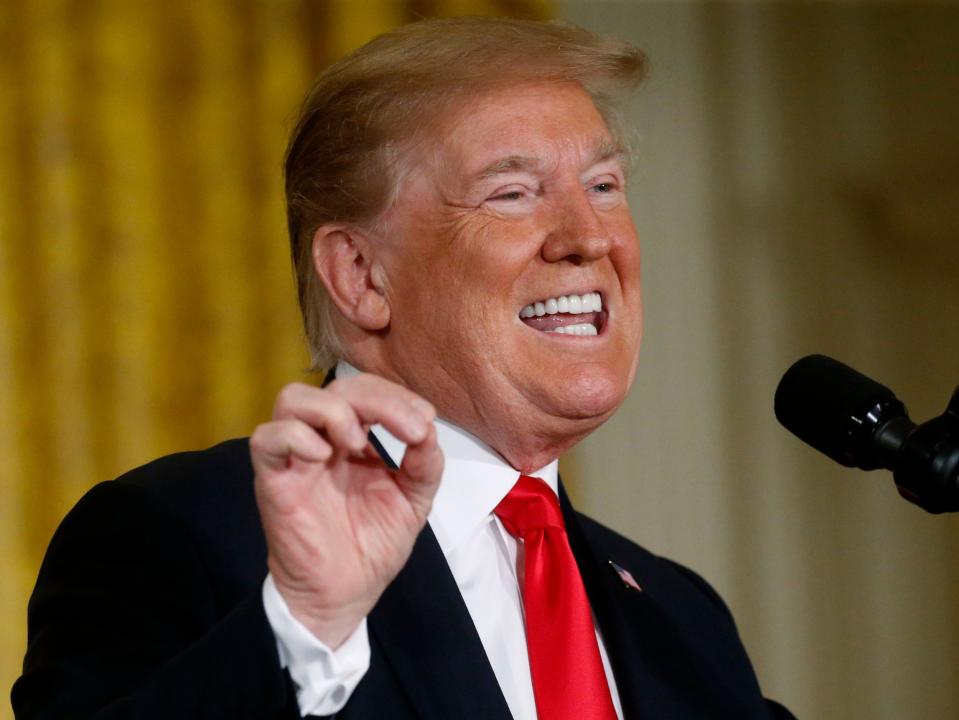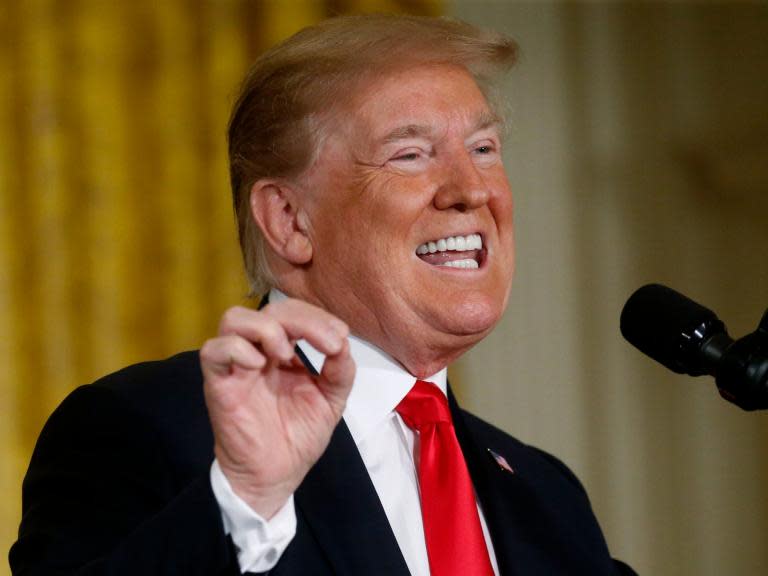France criticises Trump's policy of separating immigrant children from parents: 'We don't share certain values'
France has condemned Donald Trump’s policy of separating asylum seekers and migrants from their children at the US border, saying the countries do not share “certain values”.
Some 2,000 children have been separated from their parents at the frontier with Mexico since Mr Trump’s administration introduced its “zero tolerance” policy of charging undocumented arrivals with a criminal offence, official figures showed.
The children are held in detention centres including a former warehouse in McAllen, Texas, where hundreds of youngsters are kept in cages created from metal fencing. Their parents are separately held in federal prison.
The policy has provoked widespread backlash from charities, politicians from both of the US’ main parties, former first ladies including Laura Bush, and church groups.
Mr Trump’s administration has blamed Democrats and Congress for failing to act to stop it, but it is generally held that the president is able to unilaterally end the separations.
Senator Lindsey Graham, a supporter of Mr Trump, has said the billionaire “could stop this policy with a phone call”.
Benjamin Griveaux, a French government spokesman, said the European Union and France – which gifted the US the Statue of Liberty in the 19th century – “do not share the same model of civilisation” as America. “Clearly we don’t share certain values,” he added in an interview with France 2 television.
Images of children in cages were “shocking”, Mr Griveaux said.
In audio secretly recorded and passed to ProPublica, children can be heard screaming and crying for their parents while a US Border Patrol agent mocks their distress. “Well, we have an orchestra here,” the man is heard to say.
Attorney general Jeff Sessions and Sarah Huckabee Sanders, the White House press secretary, have defended the administration’s approach to law enforcement as “biblical”. “Orderly and lawful processes are good in themselves,” Mr Sessions said, citing Romans.
Kirstjen Nielsen, the homeland security secretary, said the government had “high standards” for its child detention centres, adding “we give them meals and we give them education and we give them medical care”.
Mr Trump defended the separations by placing his policy in contrast to the approach taken in Europe over the last few years.
“The United States will not be a migrant camp and it will not be a refugee holding facility,” he said on Monday. “You look at what’s happening in Europe, you look at what’s happening in other places – we can’t allow that to happen to the United States. Not on my watch.”
Europe’s migration crisis has increasingly defined regional politics. In Italy, a far-right and anti-establishment government now holds power and is blocking migrant landings, and in Germany, where the chancellor, Angela Merkel, has opened the door to those fleeing hunger and conflict in the Middle East and Africa, her coalition is fighting for survival over the issue.
Ms Merkel has committed to help Italy deal with the influx but faces domestic pressure, with her junior coalition partner having given her until a 28 June summit to get a migration deal with other EU countries on the matter. Germany’s interior minister, Horst Seehofer, has called for migrants to be turned away at the border, which Ms Merkel opposes.
Mr Trump seized on the divisions on Monday, tweeting that “crime in Germany is way up” because of immigration, though statistics showed that was not true.
The people of Germany are turning against their leadership as migration is rocking the already tenuous Berlin coalition. Crime in Germany is way up. Big mistake made all over Europe in allowing millions of people in who have so strongly and violently changed their culture!
— Donald J. Trump (@realDonaldTrump) June 18, 2018
Children are being used by some of the worst criminals on earth as a means to enter our country. Has anyone been looking at the Crime taking place south of the border. It is historic, with some countries the most dangerous places in the world. Not going to happen in the U.S.
— Donald J. Trump (@realDonaldTrump) June 18, 2018
CHANGE THE LAWS!
— Donald J. Trump (@realDonaldTrump) June 18, 2018
Later, he claimed “children are being used by some of the worst criminals on earth as a means to enter our country”.
“CHANGE THE LAWS!” he added, in a challenge to Congress. His administration has maintained that immigration reform is the only way to end the separations of families.
France’s president, Emmanuel Macron, has called for reform of the way the EU deals with migrants and refugees, suggesting the creation of asylum centres where applicants’ claims would be processed in their home countries.
Last Friday, during a summit with Italian prime minister, Giuseppe Conte, Mr Macron said EU regulations requiring asylum seekers to apply in the first country they reach, and stay there while their claims are decided – which have particularly affected Italy and Greece – were not working.
He cited an initiative of his government last year to establish “protection missions” which pre-screened asylum-seekers in Chad and Niger to prevent citizens risking the sea journey.
Additional reporting by agencies

 Yahoo News
Yahoo News 

